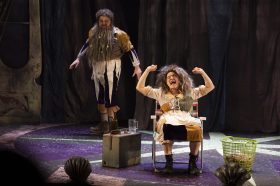Lindsay Farris in Sydney Theatre Company’s Mojo. Image by Brett Boardman.
It’s the stuff of dreams, at the age of 23, to have your first play picked up by London’s Royal Court, given awards and applause around the world and then called to direct the movie.
Jez Butterworth was catapulted into such success (and later decline into artistic self doubt) back in 1995 with the premiere of Mojo. Set in a 1950s Soho club for crims and rockers, Mojo seethes with testosterone bravado, teenage angst and violence barely restrained.
Although distinguished by a scattergun language to rival Harold Pinter, Mojo is arguably a young man’s play. Butterworth snatches at a wild and compelling all-male milieu rather than construct complex themes and characters.
This Sydney Theatre Company production, while bristling with energy, does little to recalibrate that imbalance and build detail into the relationships.
The boys feel the heat when the club’s pretty boy leader singer (Jeremy Davidson of the Snowdroppers making his stage debut) is seduced away by a rival manager. Their pill-stoked paranoia really soars when they discover the body of their own club manager, sawn in two.
As the victim’s son, Baby, cool, obtuse and sweetly threatening, Lindsay Farris gives perhaps the best performance of the night – despite taking over the role just a few days before opening. Baby too has dark secrets of abuse, and obsessively demands allegiance from the mercurial young Skinny (Eamon Farren). As loyalties shift within the besieged club and beyond, cohorts Potts (Josh McConville) and Sweets (Ben O’Toole) buzz around manically, asserting much and saying little. Amid the noise, Tony Martin provides a welcome field of still, manipulating authority as the club’s likely new manager, Mickey. It’s a familiar role for Martin but a good one.
Through their twitching and torrents of verbosity, the lads alternate their feuding and bullying with declarations of love and good times. Just as the language is from the streets of 1950s London, so too this suspended homosexuality is also oddly British.
Such cultural subtleties however are nearly lost in this somewhat Americanised version of the play where accents, rhythms and attitudes start Cockney but travel far beyond. Director Iain Sinclair also fails to punctuate the adrenaline rush with quieter moments to articulate the relationships. Some of these, like between Skinny and Mickey at the bloody high drama climax, remain inexplicable. We laugh at the comedy but are often unengaged, watching a noisy tale of just boys being boys.
Designer Pip Runciman creates a suitably cavernous and shabby cellar-like space for all these machinations to do with the club upstairs, and Nicholas Rayment lights it nicely with both shadows and club-land sparkle.
It’s a fascinating world which lingers with you, whipped up by the language and curiously effete masculinity of these teddy boys.
Rating: 3 out of 5 stars
Mojo
Sydney Theatre Company
Director: Iain Sinclair
Set Designer” Pip Runciman
Costume Designer: David Fleischer
Lighting Designer: Nicholas Rayment
Sound Designer: Steve Francis
Cast: Jeremy Davidson, Eamon Farren, Lindsay Farris, Alon Ilsar, Paul Kilpinen, Tony Martin, Josh McConville, Ben O’Toole
The Wharf Theatre, Walsh Bay
www.sydneytheatre.com.au
17 May – 5 July





